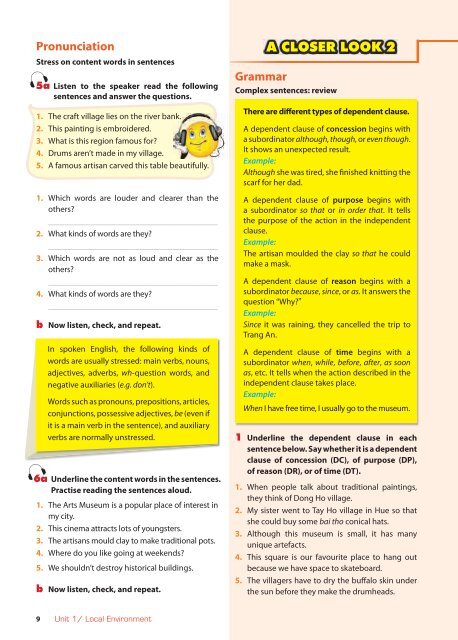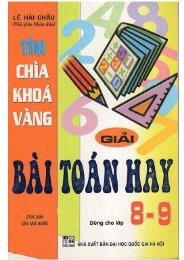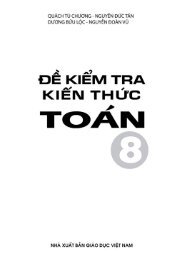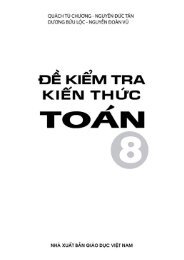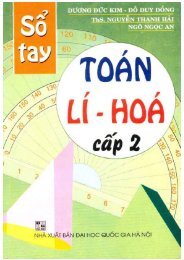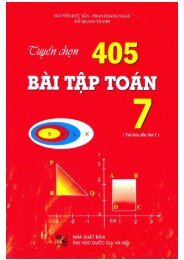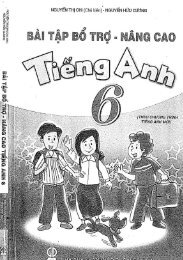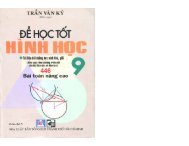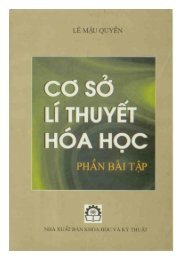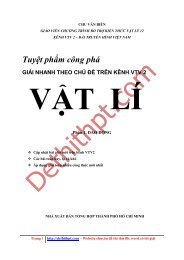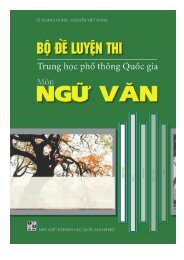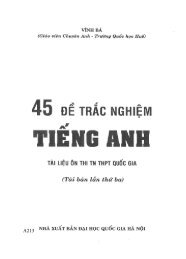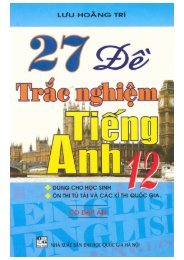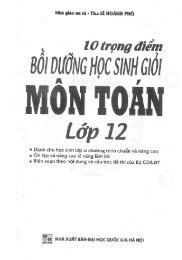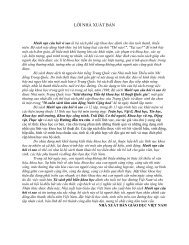Sách giáo viên Tiếng Anh 9 Thí điểm 2 tập (Pilot English 9 for Teacher)
https://app.box.com/s/rnv2yu1duebjhdpkknu2l47p9nmel5ax
https://app.box.com/s/rnv2yu1duebjhdpkknu2l47p9nmel5ax
You also want an ePaper? Increase the reach of your titles
YUMPU automatically turns print PDFs into web optimized ePapers that Google loves.
Pronunciation<br />
Stress on content words in sentences<br />
5a Listen to the speaker read the following<br />
sentences and answer the questions.<br />
1. The craft village lies on the river bank.<br />
2. This painting is embroidered.<br />
3. What is this region famous <strong>for</strong>?<br />
4. Drums aren’t made in my village.<br />
5. A famous artisan carved this table beautifully.<br />
1. Which words are louder and clearer than the<br />
others?<br />
_________________________________________________<br />
2. What kinds of words are they?<br />
_________________________________________________<br />
3. Which words are not as loud and clear as the<br />
others?<br />
_________________________________________________<br />
4. What kinds of words are they?<br />
_________________________________________________<br />
b Now listen, check, and repeat.<br />
In spoken <strong>English</strong>, the following kinds of<br />
words are usually stressed: main verbs, nouns,<br />
adjectives, adverbs, wh-question words, and<br />
negative auxiliaries (e.g. don’t).<br />
Words such as pronouns, prepositions, articles,<br />
conjunctions, possessive adjectives, be (even if<br />
it is a main verb in the sentence), and auxiliary<br />
verbs are normally unstressed.<br />
6a Underline the content words in the sentences.<br />
Practise reading the sentences aloud.<br />
1. The Arts Museum is a popular place of interest in<br />
my city.<br />
2. This cinema attracts lots of youngsters.<br />
3. The artisans mould clay to make traditional pots.<br />
4. Where do you like going at weekends?<br />
5. We shouldn’t destroy historical buildings.<br />
b Now listen, check, and repeat.<br />
A CLOSER LOOK 2<br />
Grammar<br />
Complex sentences: review<br />
There are different types of dependent clause.<br />
A dependent clause of concession begins with<br />
a subordinator although, though, or even though.<br />
It shows an unexpected result.<br />
Example:<br />
Although she was tired, she finished knitting the<br />
scarf <strong>for</strong> her dad.<br />
A dependent clause of purpose begins with<br />
a subordinator so that or in order that. It tells<br />
the purpose of the action in the independent<br />
clause.<br />
Example:<br />
The artisan moulded the clay so that he could<br />
make a mask.<br />
A dependent clause of reason begins with a<br />
subordinator because, since, or as. It answers the<br />
question “Why?”<br />
Example:<br />
Since it was raining, they cancelled the trip to<br />
Trang An.<br />
A dependent clause of time begins with a<br />
subordinator when, while, be<strong>for</strong>e, after, as soon<br />
as, etc. It tells when the action described in the<br />
independent clause takes place.<br />
Example:<br />
When I have free time, I usually go to the museum.<br />
1 Underline the dependent clause in each<br />
sentence below. Say whether it is a dependent<br />
clause of concession (DC), of purpose (DP),<br />
of reason (DR), or of time (DT).<br />
1. When people talk about traditional paintings,<br />
they think of Dong Ho village.<br />
2. My sister went to Tay Ho village in Hue so that<br />
she could buy some bai tho conical hats.<br />
3. Although this museum is small, it has many<br />
unique artefacts.<br />
4. This square is our favourite place to hang out<br />
because we have space to skateboard.<br />
5. The villagers have to dry the buffalo skin under<br />
the sun be<strong>for</strong>e they make the drumheads.<br />
9 Unit 1/ Local Environment


